| Listing 1 - 7 of 7 |
Sort by
|
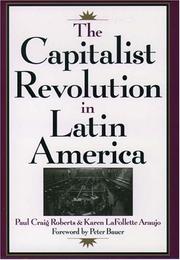
ISBN: 0195111761 0198027192 1280529318 1429414677 9780198027195 019771000X Year: 1997 Publisher: New York ; Oxford Oxford University Press
Abstract | Keywords | Export | Availability | Bookmark
 Loading...
Loading...Choose an application
- Reference Manager
- EndNote
- RefWorks (Direct export to RefWorks)
This work looks at what is happening in Latin America and what it will mean to countries outside the region, especially the USA. It takes an optimistic view of the future of Latin America and criticizes institutions like the World Bank and the IMF for subsidizing the old regime.
Capitalism --- Capitalisme --- Latin America --- Amérique latine --- Economic conditions --- Economic policy --- Conditions économiques --- Politique économique --- LAM / Latin America - Latijns Amerika - Amérique Latine --- 331.31 --- 331.30 --- 338.313 --- 331.32 --- Economisch beleid. --- Economische toestand. --- Kapitalisme. --- Structuur van de economie. --- Amérique latine --- Conditions économiques --- Politique économique --- Economic policy. --- E-books --- Economische toestand --- Economisch beleid --- Structuur van de economie --- Kapitalisme --- 1982-.... --- Latin America - Economic conditions - 1982 --- -Latin America --- -Capitalism --- Latin America - Economic conditions - 1982-
Book
ISBN: 2080354884 9782080354884 Year: 1997 Volume: 142 Publisher: Paris: Flammarion,
Abstract | Keywords | Export | Availability | Bookmark
 Loading...
Loading...Choose an application
- Reference Manager
- EndNote
- RefWorks (Direct export to RefWorks)
Post-communism --- Europe, Eastern --- Economic conditions --- Politics and government --- EEU / Central & Eastern Europe --- 338.313 --- 330.52 --- 331.33 --- Kapitalisme. --- Liberaal systeem. Neo-liberalisme. Theorie van de onderhandeling. --- Structureel beleid. Reglementering. Dereglementering. Ordnungspolitik. --- Kapitalisme --- Liberaal systeem. Neo-liberalisme. Theorie van de onderhandeling --- Structureel beleid. Reglementering. Dereglementering. Ordnungspolitik --- Post-communism - Europe, Eastern --- Europe, Eastern - Economic conditions - 1989 --- -Europe, Eastern - Politics and government - 1989 --- -EEU / Central & Eastern Europe --- -Post-communism - Europe, Eastern --- -Post-communism
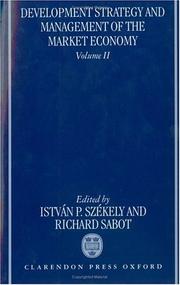
ISBN: 0198292120 0198292503 9780198292128 9780198292500 Year: 1997 Publisher: Oxford: Clarendon,
Abstract | Keywords | Export | Availability | Bookmark
 Loading...
Loading...Choose an application
- Reference Manager
- EndNote
- RefWorks (Direct export to RefWorks)
Macroeconomics --- Capitalism --- Economic development --- Economic stabilization --- Economic policy --- AA / International- internationaal --- 338.8 --- 338.313 --- 330.52 --- Economische groei. --- Kapitalisme. --- Liberaal systeem. Neo-liberalisme. Theorie van de onderhandeling. --- Capitalism. --- Economic development. --- Economic policy. --- Economic stabilization. --- Macroeconomics. --- Economics --- Adjustment, Economic --- Business stabilization --- Economic adjustment --- Stabilization, Economic --- Economic nationalism --- Economic planning --- National planning --- State planning --- Planning --- National security --- Social policy --- Development, Economic --- Economic growth --- Growth, Economic --- Statics and dynamics (Social sciences) --- Development economics --- Resource curse --- Market economy --- Profit --- Capital --- Liberaal systeem. Neo-liberalisme. Theorie van de onderhandeling --- Kapitalisme --- Economische groei
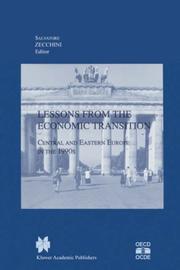
ISBN: 0792398572 940115368X 0792398521 Year: 1997 Publisher: Dordrecht : Kluwer academic,
Abstract | Keywords | Export | Availability | Bookmark
 Loading...
Loading...Choose an application
- Reference Manager
- EndNote
- RefWorks (Direct export to RefWorks)
An attentive reader embarking on this book might wonder what "the" economic transition to which the title refers might be. In this century almost all countries have gone through periods of economic transition; but which period of economic history can claim to embody the notion or to represent the era of "the" transition? Definitely, no country or group of countries has experienced anything comparable to the economic upheavals that the fall of communism has brought about in a large portion of the world in just three years (1989 to 1991). No other "transition" to date has prompted more interest and more studies among economists, academics and policy-makers than has the transformation of centrally planned economies into market-based systems. It is this transformation that has come to define "the" transition. Early in the transformation process (in November 1990), with the support of the Centre for Co-operation with the Economies in Transition (CCET), I launched a conference to examine the challenges faced by these countries. About six years have gone by and a new economic landscape has emerged in that part of the world. The difficulties in transforming these economies have exceeded all expectations, and economic performances have varied considerably across countries. The time has come, therefore, to make a first evaluation of progress and problems, with a view to extracting useful policy lessons to guide policy-makers in successfully completing the transition in the near future.
Macroeconomics. --- International economics. --- Economics. --- International Economics. --- Economic Systems. --- Macroeconomics/Monetary Economics//Financial Economics. --- 338.26 <4-11> --- 330.52 --- 330.548 --- 331.31 --- 331.33 --- 332.630 --- 333.420.2 --- 338.313 --- EEU / Central & Eastern Europe --- 338.947 --- 338.26 <4-11> Economische planning. Nationale plannen. Ontwikkelingsplannen. Meerjarenplannen. Plattelandsontwikkeling. Rural development. Kosten-batenanlyse--Oost-Europa --- Economische planning. Nationale plannen. Ontwikkelingsplannen. Meerjarenplannen. Plattelandsontwikkeling. Rural development. Kosten-batenanlyse--Oost-Europa --- Liberaal systeem. Neo-liberalisme. Theorie van de onderhandeling. --- Nationalisatie. Privatiseringen. --- Economisch beleid. --- Structureel beleid. Reglementering. Dereglementering. Ordnungspolitik. --- Strijd tegen de werkloosheid: algemeen. Theorie en beleid van de werkgelegenheid. Volledige werkgelegenheid. --- Inwisselbaarheid in vreemde valuta's. --- Kapitalisme. --- Europe, Central --- -Europe, Central --- -Europe, Eastern --- Europe, Eastern --- East Europe --- Eastern Europe --- Central Europe --- Economic conditions --- Economic policy --- -Economic policy --- -338.26 <4-11> --- Europe centrale --- Europe de l'Est --- Economic policy. --- Economic conditions. --- Politique économique --- Conditions économiques --- Liberaal systeem. Neo-liberalisme. Theorie van de onderhandeling --- Nationalisatie. Privatiseringen --- Economisch beleid --- Structureel beleid. Reglementering. Dereglementering. Ordnungspolitik --- Strijd tegen de werkloosheid: algemeen. Theorie en beleid van de werkgelegenheid. Volledige werkgelegenheid --- Inwisselbaarheid in vreemde valuta's --- Kapitalisme --- Europe [Central ] --- Europe [Eastern ] --- 1989 --- -Europe [Central ] --- -338.947 --- Political Economy/Economic Systems. --- Economics --- Economic theory --- Political economy --- Social sciences --- Economic man --- Economic nationalism --- Economic planning --- National planning --- State planning --- Planning --- National security --- Social policy --- Economic policy, Foreign --- Economic relations, Foreign --- Economics, International --- Foreign economic policy --- Foreign economic relations --- Interdependence of nations --- International economic policy --- International economics --- New international economic order --- International relations --- Economic sanctions
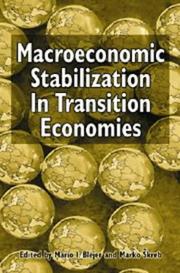
ISBN: 052158177X 0521025354 0511572018 9780521581776 9780511572012 9780521025355 Year: 1997 Publisher: Cambridge Cambridge University Press
Abstract | Keywords | Export | Availability | Bookmark
 Loading...
Loading...Choose an application
- Reference Manager
- EndNote
- RefWorks (Direct export to RefWorks)
The essays in this volume explore the special type of policies that were needed in the post-socialist countries of Eastern Europe and the former Soviet Union in order to reduce inflation and to stop the fall in output that followed the collapse of Communism. The book contains a number of general studies that discuss the type of reforms needed and how they condition policies and analyse the aggregate relationship between reducing inflation, implementing structural reforms, and renewing the process of growth. It includes a number of country studies (on the Baltics, Croatia, Hungary, Poland, Slovenia and the Ukraine) about their stabilization experiences. Thus the emerging picture is one of renewal of growth in those countries that proceeded early and with the determination to implement market-oriented reforms and to stabilize their macroeconomy, and of gradual and slow stabilization of output in those countries that entered the process only very recently.
Economic stabilization --- Stabilisation économique --- Europe, Eastern --- Former Soviet republics --- Europe de l'Est --- Ex-URSS --- Economic policy --- Economic conditions --- Politique économique --- Conditions économiques --- 330.52 --- 330.548 --- 331.31 --- 331.33 --- 338.313 --- CIS / Commonwealth Of Independant States - Gos - Cei --- EEU / Central & Eastern Europe --- NBB congres --- Transition economics --- -Economic stabilization --- -339.50947 --- Uk1.3.2.f --- Adjustment, Economic --- Business stabilization --- Economic adjustment --- Stabilization, Economic --- Liberaal systeem. Neo-liberalisme. Theorie van de onderhandeling. --- Nationalisatie. Privatiseringen. --- Economisch beleid. --- Structureel beleid. Reglementering. Dereglementering. Ordnungspolitik. --- Kapitalisme. --- -Former Soviet republics --- -CIS countries --- Commonwealth of Independent States countries --- Ex-Soviet republics --- Ex-Soviet states --- Former Soviet states --- New Independent States (Former Soviet republics) --- Newly Independent States (Former Soviet republics) --- NIS (Former Soviet republics) --- East Europe --- Eastern Europe --- -Economic policy --- -Economic conditions --- Conferences - Meetings --- Stabilisation économique --- Politique économique --- Conditions économiques --- 339.50947 --- Liberaal systeem. Neo-liberalisme. Theorie van de onderhandeling --- Nationalisatie. Privatiseringen --- Economisch beleid --- Structureel beleid. Reglementering. Dereglementering. Ordnungspolitik --- Kapitalisme --- Economic conditions. --- Economic policy. --- Business, Economy and Management --- Economics --- Economic stabilization - Europe, Eastern. --- Economic stabilization - Former Soviet republics.
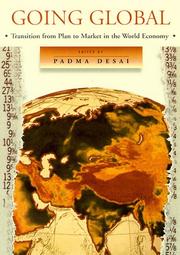
ISBN: 0262271583 0585133484 9780585133485 0262041618 9780262271585 Year: 1997 Publisher: Cambridge, Mass. MIT Press
Abstract | Keywords | Export | Availability | Bookmark
 Loading...
Loading...Choose an application
- Reference Manager
- EndNote
- RefWorks (Direct export to RefWorks)
The transition of the former socialist and otherwise centrally planned economies into the world trading and financial system has become a major concern to both policymakers and social scientists. In this book, experts from diverse economies address the principal issues raised by this transition. The chapters, which cover fourteen countries of East and Central Europe, the former Soviet Union, and Asia, are the result of a three-year research project. Although the contributors share a unity of design and analysis, each author focuses on the issues most relevant to the country or countries under discussion. In her introductory essay, project leader Padma Desai synthesizes the findings and cuts through recent analytical confusion over such issues as "shock therapy" versus gradualism. Rather than advocate "the faster the better," she discusses the possible difficulty of sustaining rapid transition reforms and globalization in the face of rising unemployment.
International economic integration. --- Central planning. --- Privatization. --- Commercial policy. --- Investments, Foreign. --- International economic integration --- Central planning --- Privatization --- Commercial policy --- Investments, Foreign --- Commerce --- Business & Economics --- International Commerce --- Capital exports --- Capital imports --- FDI (Foreign direct investment) --- Foreign direct investment --- Foreign investment --- Foreign investments --- International investment --- Offshore investments --- Outward investments --- Capital movements --- Investments --- Foreign trade policy --- International trade --- International trade policy --- Trade policy --- Economic policy --- International economic relations --- Denationalization --- Privatisation --- Contracting out --- Corporatization --- Government ownership --- Central economic planning --- Centrally planned economy --- Economic planning --- National planning --- State planning --- Planning --- Common markets --- Economic integration, International --- Economic union --- Integration, International economic --- Markets, Common --- Union, Economic --- Government policy --- 330.52 --- 330.548 --- 331.31 --- 331.33 --- 338.313 --- CIS / Commonwealth Of Independant States - Gos - Cei --- CN / China - Chine --- EEU / Central & Eastern Europe --- IN / India - Inde --- VN / Vietnam --- 339 --- 339 Handel. Internationale economische betrekkingen. Wereldeconomie --binnenlandse als buitenlandse handel; zie ook {339.3} en {339.5} --- Handel. Internationale economische betrekkingen. Wereldeconomie --binnenlandse als buitenlandse handel; zie ook {339.3} en {339.5} --- Liberaal systeem. Neo-liberalisme. Theorie van de onderhandeling --- Nationalisatie. Privatiseringen --- Economisch beleid --- Structureel beleid. Reglementering. Dereglementering. Ordnungspolitik --- Kapitalisme
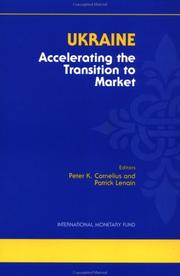
ISBN: 1462317855 145527903X 1283536641 9786613849090 1455228508 9781455228508 1557756198 9781557756190 Year: 1997 Publisher: [Washington, D.C.]
Abstract | Keywords | Export | Availability | Bookmark
 Loading...
Loading...Choose an application
- Reference Manager
- EndNote
- RefWorks (Direct export to RefWorks)
Ukraine has made impressive progress in restructuring and stabilizing its economy over the past two years, and yet much remains to be done to revive output and establish a market economy. The 16 papers included in this volume, edited by Peter K. Cornelius and Patrick Lenain, were presented at a seminar sponsored by the IMF and the World Bank in July 1996, which brought together government officials, academics, and staffs of international organizations to discuss a comprehensive medium- term strategy for Ukraine. The papers cover the medium-term macroeconomic framework; wages, poverty, and social safety net reform; private sector development; trade policies and sectoral reforms; and institution building and good governance.
Post-communism --- Postcommunism --- World politics --- Communism --- Economic aspects --- Ukraine --- An Úcráin --- I-Yukreyini --- IYukreyini --- Malorosii︠a︡ --- Małorosja --- Oekraïne --- Ookraan --- Oukraïne --- Oykrania --- Petite-Russie --- U.S.R.R. --- Ucrægna --- Úcráin --- Ucraina --- Ucrania --- Ucrayena --- ʻUkelena --- Ukraïna --- Ukrainæ --- Uḳraʼinah --- Ukrainian Council Socialist Republic --- Ukrainian S.S.R. --- Ukrainian Socialist Soviet Republic --- Ukrainian Soviet Socialist Republic --- Ukrainio --- Ukrainmudin Orn --- Ukraïnsʹka Radi︠a︡nsʹka Sot︠s︡ialistychna Respublika --- Ukrainska Radyanska Sotsialistychna Respublika --- Ukrainska Sotsialistychna Radianska Respublika --- Ukraïnsʹka Sot︠s︡ii︠a︡listychna Radi︠a︡nsʹka Respublika --- Ukrainskai︠a︡ Sovetskai︠a︡ Sot︠s︡ialisticheskai︠a︡ Respublika --- Ukrainskaya Sovetskaya Sotsialisticheskaya Respublika --- Ukrainujo --- Ukrajina --- Ūkrāniyā --- Ukranya --- Ukrayiina --- Ukrayina --- Ukrayna --- Ukuraina --- Ukyáña --- Wcráin --- Yn Ookraan --- Yr Wcráin --- Yukrain --- Ουκρανία --- Украинæ --- Украина --- Украинэ --- Украинмудин Орн --- Україна --- אוקראינע --- אוקראינה --- أوكرانيا --- ウクライナ --- 우크라이나 --- Ukraine (Hetmanate : 1648-1782) --- Economic policy --- Economic conditions --- Social policy --- 338.9477 --- 330.52 --- 331.30 --- 331.32 --- 331.33 --- 338.313 --- UA / Ukraine - Oekraine --- 338.24 <477.87> --- 338.24 <477.87> Instrumenten van de economische politiek. Economische orde. Economisch politieke maatregelen. Stabilisering. Stimuleringsmaatregelen. Regulering. Financiele steunmaatregelen--?<477.87> --- Instrumenten van de economische politiek. Economische orde. Economisch politieke maatregelen. Stabilisering. Stimuleringsmaatregelen. Regulering. Financiele steunmaatregelen--?<477.87> --- Economic aspects&delete& --- Congresses --- Liberaal systeem. Neo-liberalisme. Theorie van de onderhandeling --- Economische toestand --- Structuur van de economie --- Structureel beleid. Reglementering. Dereglementering. Ordnungspolitik --- Kapitalisme --- Congresses. --- International finance --- Exports and Imports --- Labor --- Macroeconomics --- Public Finance --- Poverty and Homelessness --- Wages, Compensation, and Labor Costs: General --- Welfare, Well-Being, and Poverty: General --- Social Security and Public Pensions --- Agriculture: General --- Trade: General --- Taxation, Subsidies, and Revenue: General --- Labour --- income economics --- Public finance & taxation --- International economics --- Poverty & precarity --- Pensions --- Poverty --- Wages --- Pension spending --- Legal support in revenue administration --- Privatization --- Expenditure --- Revenue administration --- Commercial banks --- Financial institutions --- Economic sectors --- Exports --- International trade --- Banks and banking --- Expenditures, Public --- Revenue --- Income economics
| Listing 1 - 7 of 7 |
Sort by
|

 Search
Search Feedback
Feedback About UniCat
About UniCat  Help
Help News
News